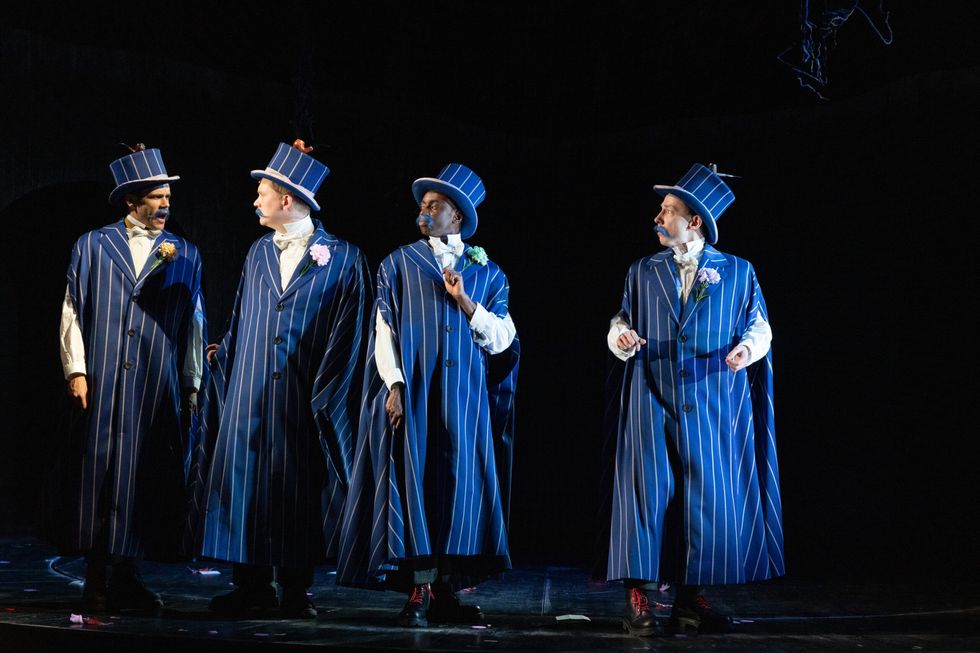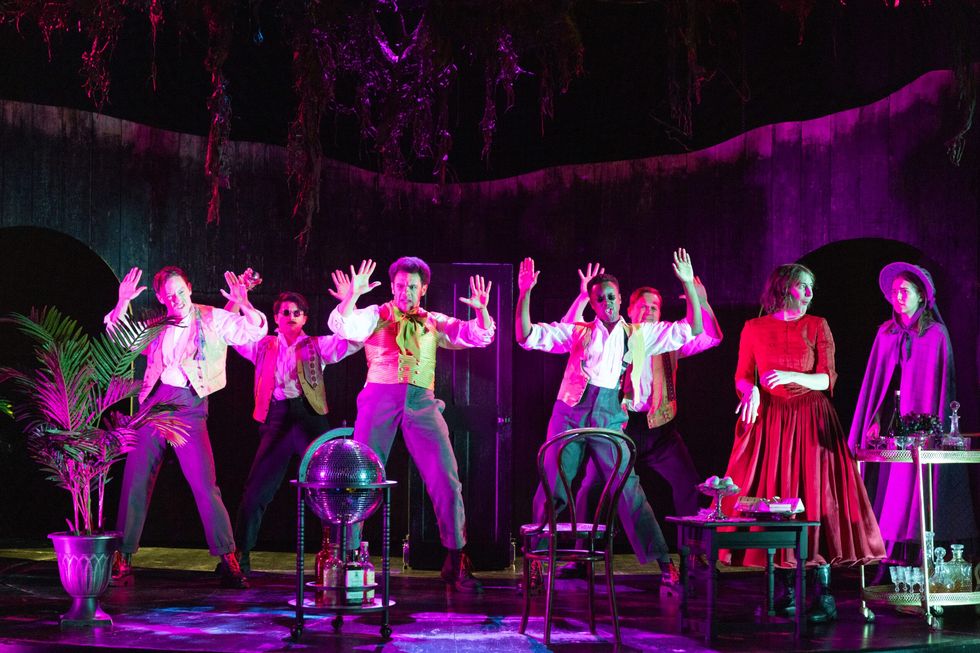SARAH GORDON’S play at the National, Underdog: The Other Brontë, brings the story of the Brontë sisters from the 19th century and locates it in modern times.
The play focuses not just on the bond between Charlotte, Emily and Anne Brontë, but just as much if not even more on their sibling rivalry as published authors.
Charlotte (April 21, 1816 – March 31, 1855) is best known for her novel, Jane Eyre, which was published in 1847. She is played by Gemma Whelan.
Emily (July 30, 1818 – December 19, 1848) is famous for her only novel, Wuthering Heights, also published in 1847. Set in the wild Yorkshire Moors, it tells of the doomed love affair between Heathcliff and Cathy. Emily is played by Adele James.
Anne (January 17, 1820 – May 28, 1849), wrote two novels, Agnes Grey and The Tenant of Wildfell Hall, published in 1847 and 1848, respectively. She is played by Rhiannon Clements. The second novel is based on Anne’s experience as a governess between 1839 and 1845.
Charlotte, Emily and Anne initially pretended to be men, and wrote under the pseudonyms, Currer, Ellis and Actor Bell, respectively, because society frowned on women novelists.

The order in which their debut novels came out is important – Charlotte was first, followed by Emily and Anne, whose first books were published simultaneously.
Their brother, Branwell (June 26, 1817 – September 24, 1848), is also cast in the play. He did not want to take up the cloth, as his father wished, and never succeeded in fulfilling his desire to be a great artist. He is played by James Phoon.
What is sad is how in England at that time so many died young because of tuberculosis and related diseases. Charlotte, Emily, Anne and Branwell died aged 38, 30, 29 and 31, respectively. The sisters have left their imprint on English literature, but one imagines they could have done so much more had they lived – like Charles Dickens – into their late fifties.
There is plenty of diversity in the casting, which is something to which the National Theatre has been committed under its outgoing director, Rufus Norris. Several members of the cast, including James (daughter of a Jamaican father and an English mother) as well as the ensemble, are black, as is the director, Natalie Ibu, who is the artistic director and joint chief executive of Northern Stage.
It is remarkable how quickly audiences have got used to both diversity in the casting and gender fluidity with men playing women and vice versa.
The playwright has said in a note to the director that there could be “multiple parts played per actor. Roles should not be assigned based on gender.”
She added: “The play is told from Charlotte’s present day point of view and as such has a modern sensibility to it. This is reflected in dialogue.”
Personally, I wasn’t sure about the wisdom of putting four-letter swearing so liberally in the dialogue of the sisters. But others might take a different view.
All in all, Charlotte does not always come across as a nice woman. She is determined to be the celebrity author in the family and does not take kindly to competition.
This I found quite shocking. Was Charlotte really so insecure in real life?
After the death of Anne, her publisher, George Smith, seeks permission to reprint The Tenant of Wildfell Hall.
George: Your sister’s novel, The Tenant of Wildfell Hall, has sold out again.
Charlotte: It has?
George: Good news.
Charlotte: Yeah. Great….
George: So just checking I’ve got your permission to reprint it? You have all the rights to your sister’s work, so I just need clearance.
Charlotte: Why?
George: Why?
Charlotte: Yes, why? If all the copies are gone, then all the copies are gone.
George: Are you alright?
Charlotte: Yes, I just don’t see why it needs to be reprinted.
George: Well, because, if anything we think it’s only going to gain in popularity. It becomes more relevant every day. You want her legacy to live on, don’t you?
Charlote: Mmm.
George: So? Do I have your permission?
Charlotte: No.
George: No?
George is stunned at Charlotte’s refusal.
Charlotte: It was a mistake.
George: A mistake?
Charlottle: My sister, Mr Smith, was an angel.
George: Oh, absolutely.
Charlotte: But in writing this she was misguided. Immature…She was trying to shock me, I think. Trying to prove herself to her big sister. You see? No. I will not have the whole country poking and deriding her. She was a perfect woman. And she shall remain as such. A greater readership would destroy her reputation, not make it.”
George: Well, ah…Without wishing to seem indelicate Miss Brontë, …her reputation ..in terms of marriage, in terms of, um, ‘respectability’, is, um, well. Might be seen to be, um, beside the point…Now that she’s, um, dead. Charlotte: Well then. It would destroy mine. George: You don’t think she is a threat to you. Charlotte: And we can’t have that.

On behalf of the Brontë sisters, it should be pointed out that they were writing at a time when authorship was considered a male preserve. Charlotte had expressed the wish she wanted to be “forever known”.
One reply Charlotte received was from Robert Southey, the Poet Laureate, who said: “Literature cannot be the business of a woman’s life, and it ought not to be.”
Charlotte sets out the reality that men can keep out women: “Listen, men – writers, like him are the gatekeepers. Whoever is in that room with them has the power to dictate what is acceptable and what is not, and I need what I think to be acceptable.
“I spend more time trying to deny myself the thoughts I have because I know as a woman I shouldn’t have them than the hours I spend writing them down anyway. It’s fxxxxed.”
When Anne takes up a role as governess at an estate called Mirfield, the lady of the house, Mrs Ingham – the actor Nick Blakeley switches male clothes to female attire to play the role – tells her: “I have four chil dren; three girls, Mary, Martha and Emily; and a boy, Cunliffe.”
She adds: “When teaching my children you are not permitted to reprimand them, intimidate them in any way. That is my privilege. As you are not a lady, you will naturally not dine with the family.”
Anne uses her experience as a governess, but gets little encouragement when she asks Charlotte to read her manuscript.
Charlotte tells her youngest sister: “Sorry, I just didn’t realise that writing was like your thing, I guess.”
She is angrier when she learns Anne is seeking a publisher: “You are not serious.”
But Charlotte is not above pinching Anne’s plot and managing to get her novel published first. She tells Anne: “You are not worried that there are two novels with the same subject matter. You are worried mine is better.”
The play also touches on reviews by male critics where rumours begin that the Bells could be women: “The book’s masculine hardness, coarseness, and freedom of expression are entirely inappropriate for a female author.” Another reviewer comments: “No woman could possibly have written such vulgarity.”
Underdog: The Other Brontë is at the Dorfman Theatre at the National Theatre in a co-production with Northern State until May 25






 Naeli and the secret song
Naeli and the secret song








 Jamie Lloyd’s Evita with Rachel Zegler set for Broadway after London triumphInstagram/
Jamie Lloyd’s Evita with Rachel Zegler set for Broadway after London triumphInstagram/
 A compelling premise, layered and unpredictable charactersAMG
A compelling premise, layered and unpredictable charactersAMG Anyone who enjoys a gripping story with a diverse cast and unexpected twistsHarperFiction
Anyone who enjoys a gripping story with a diverse cast and unexpected twistsHarperFiction
 The Story Teller by Ley Roberts
The Story Teller by Ley Roberts Summer Exhibition coordinator Farshid Moussavi, with Royal Academy director of exhibitions Andrea Tarsia in the background
Summer Exhibition coordinator Farshid Moussavi, with Royal Academy director of exhibitions Andrea Tarsia in the background An installation by Ryan Gander
An installation by Ryan Gander A sectional model of DY Patil University Centre of Excellence, Mumbai, by Spencer de Grey
A sectional model of DY Patil University Centre of Excellence, Mumbai, by Spencer de Grey Rituals and Identity and Theatre of Resistance by Arinjoy Sen
Rituals and Identity and Theatre of Resistance by Arinjoy Sen
 An explosive new play that fuses biting satire, history and heartfelt storytellingPleasance
An explosive new play that fuses biting satire, history and heartfelt storytellingPleasance